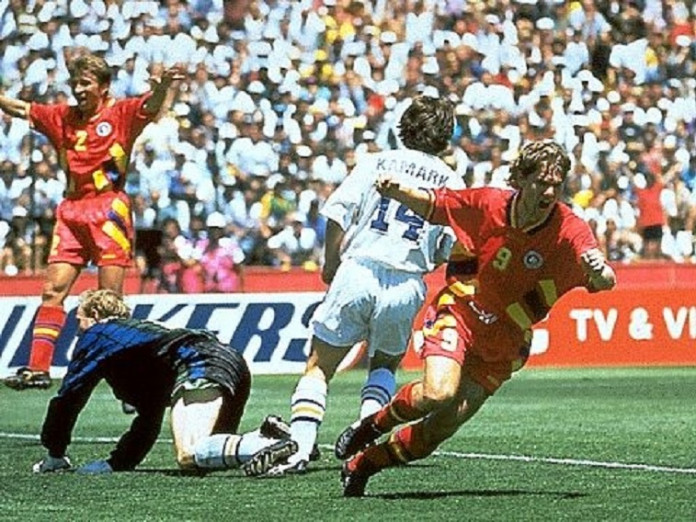The greatest football show on earth has been the stage for the most intense and nail-biting encounters ever to be witnessed by the passionate fans all around the world.
The following article, a part of a sequel, will feature the best World Cup games from its 84 year old journey. Although classified as a countdown, it is certain that each game carries its own right and uniqueness to be characterized as a ‘World Cup classic’.
10. Romania vs Sweden – 1994 (2-2 a.e.t.) (4-5 p.k)
Although it does not appear in everyone’s list of favourites, this quarterfinal clash in Stanford Stadium, California was nothing short of excitement as it was decorated by the build-up, late goals and the sudden death penalty shoot-out. Romania entered the game as the surprise package after topping their group and knocking out Argentina during the round of 16.
The game was deadlocked until the 78th minute when Tomas Brolin scored for Sweden. After gaining the lead, the Swedes were holding up against the resilient Romanians but the 88th minute saw Florin Raducioiu equalizing as the match went into extra time. Raducioiu scored his second during extra time but a certain Romanian victory was hindered five minutes from time when Kennet Andersson made it level. The winner of the 2-2 scoreline was to be decided by penalties. After penalties were leveled at 4-4 following regular spot kicks, the game went into sudden death while Miodrag Belodedici missed his kick giving the Swedes a 5-4 win.
9. West Germany vs Netherlands 2-1 (1974 – final)
When West Germany hosted the big event in 1974, all the attention was drawn towards the beautiful brand of football fostered by the Dutch. Inspired by their manager Rinus Michels and spearheaded by Johan Cruyff, they introduced ‘Total Football’ to the world. The Netherlands demonstrated the Total Football techniques pioneered by the Dutch club Ajax, in which specialized positions were abolished for the outfield players as individual players became defenders, midfielders or strikers as the situation required. The final was played in Munich between the hosts and the Total Footballers who were underlined by credentials as potential world champions. The game opened with the Dutch taking the lead even before a single German player had managed to touch the ball. Cruyff was fouled on the penalty area after a desperate attempt to gain possession. Johan Neeskens stepped up to score the fastest goal in a World Cup final, converting the penalty to give the early lead. The constant dominance of their unique style of play however failed to convert into a second goal, giving the opportunity for hosts to bounce back as Paul Breitner equalized through a penalty in the 25th minute. Striker Gerd Muller made it 2-1 in favour of the hosts just before the breather. During the second half, the German defense held firm as the orange army poured forward with wave after wave of attacks. It was evident that Helmut Schon’s men had already mastered the Dutch attack. Skipper Franz Beckenbauer and his team held on for the remaining half as they overwhelmed Total Football to earn their second world title, beating the best team in the 70’s era.
8. Brazil vs Poland – 1938 (6-5 a.e.t.)
This 11-goal thriller from way back in 1938, is probably the least watched, perhaps a forgotten classic. A crowd of 15,000 in a soggy Stade de la Meinau in Strasbourg witnessed debutants Poland taking on a high quality Brazilian side. In a tournament which featured an entire knockout format, Poland’s first game was graced by Brazil. Back then, teams were more concentrated on the attack so it was not surprising that Poland featured 5 forwards in their line-up while the Brazilian attack was led by the ‘Black Diamond’ Leonidas, the eventual top scorer of the tournament.
Leonidas opened the scoring for Brazil in the 18th minute but a foul on Ernest Wilimowski five minutes later, resulted in a penalty where Friedrich Scherfke leveled the score. However Romeu and Peracio pulled back the advantage, giving a 3-1 lead to the South Americans at the half. As it started to rain, the Polish team took advantage of the wet conditions as Wilimowski twice beat Batatais within 6 minutes making the score 3-3 at the hour mark.
Soon after rain stopped, the revived Brazilian side took command as Peracio scored his second in the 71st minute but they were undone two minutes from time when Wilimowski completed his hat-trick. The 4-4 scoreline meant extra time. However the Polish fairytale soon ended as Leonidas found back of the net in the 93rd and 104th minute to give a two-goal lead. Although Wilimowski’s strike in the 118th minute produced a short scare for the ‘Selecao’, they managed to hold on for vital two minutes securing a 6-5 win in this memorable goal-fest. Ernest Wilimowski went down in history as the first player to score four goals in a World Cup game but was unfortunate to end up in the losing side.
7. Argentina vs England 1998 (2-2 a.e.t.) (4-3 p.k)
Unlike 1970’s and 80’s, the recent past has rarely featured memorable games besides this epic encounter played in Saint Etienne during the round of 16 in France ’98. The build-up for this game was dominated by the talk of England gaining revenge for the 1986 quarterfinal.
The game began with Gabriel Batistuta putting Argentina in front following a penalty in the 6th minute. In the 10th minute, England were given the chance to draw level as young Michael Owen went down in the penalty area, resulting in a disputed decision. Alan Shearer made it 1-1 with the spot kick. In the 16th minute, the youngster ruptured the Argentine defense with a splendid solo run, turning it into an excellent finish giving a 2-1 lead to the English. The goal by Owen was rated as one of the best in World Cup history, only being second to Maradona’s ‘Goal of the Century’. The Argentine experience spoke when Javier Zanetti scored through a well mastered set piece following a free kick, leveling the scores just before half time. However the turning point of the game occurred when David Beckham was red carded on reacting for a foul by the Argentine captain Diego Simeone. The skipper received an initial caution for the foul but Beckham was sent off for his retaliation which was unnecessary at a crucial point of the game. During extra time, a moment of joy was foiled where a Sol Campbell goal was disallowed following a foul on the goalkeeper Carlos Roa. As the England players began to celebrate a winning goal the referee blew for a foul that Shearer committed on the Argentine goalkeeper prior to the goal and disallowed it. The consequent free kick was taken very quickly, while the England players were still celebrating, Darren Anderton one of the few English players to realise the referee’s decision, made a last ditch tackle to prevent Argentina from scoring.
As the game proceeded into penalties, England took the early advantage when David Seaman blocked Hernan Crespo’s spot kick. But Carlos Roa came on to become the hero as he denied penalties of Paul Ince and David Batty, giving the Argentines a 4-3 win. Roa replicated the heroics of his predecessor Sergio Goycochea from 1990, taking Argentina to the next round.
6. Italy vs Brazil 1982 (3-2)
The 1982 World Cup in Spain welcomed probably the strongest Brazilian team after 1970. Along with the likes of Zico, Falcao, Junior, Eder and the captain Socrates, this Brazilian outfit was probably the strongest team never to win a World Cup. It took a well organized Italian team led by Dino Zoff, to defeat them in the second round of the tournament.
In the second round, Italy, Argentina and Brazil were drawn in the same group, making it the ‘group of death’ as only one team had the opportunity to move forward. Both teams beat Argentina, creating the platform for a ‘do or die’ battle in Estadi de Sarria. Due to superior goal difference of Brazil, a win for the Italians was mandatory while a draw would have taken the South Americans to the knockout stage.
Striker Paolo Rossi opened the scoring in the 5th minute when he headed a cross by Antonio Cabrini. But the lead lasted just seven minute as Socrates equalized for Brazil. Rossi who had already scored his first goal of the tournament, sent home his second in the 25th minute following an interception. The game stood 2-1 in favour of the Italians at the half. The Brazilian team began its resurgence while continuous attacks paid off in the 68th minute when Falcao made it 2-2 with a firing shot from 20 yards out. The frustration on the Italian camp grew as their lead for a potential victory was undone twice, until Rossi completed his hat-trick providing a 3-2 lead which eventually turned out to be the winner. A shot by Antognoni, a possible fourth goal in the 86th minute was wrongly disallowed for offside, keeping the intensity and the ceaseless action flowing until full time.
The win for the Italians was seen by many as a win for the less talented and more organized teams. After failing to live up to the expectations in the first round, Paolo Rossi went on to score six goals, winning both Golden Boot and Golden Ball awards.
Italy, later went on to win its third World Cup crown while the hero of this classic encounter Paolo Rossi remains the last and one of only three players to win all three major awards (World Cup, Golden Boot, Golden ball) in the same tournament, while the others being Garrincha (1962) and Mario Kempes (1978).






























